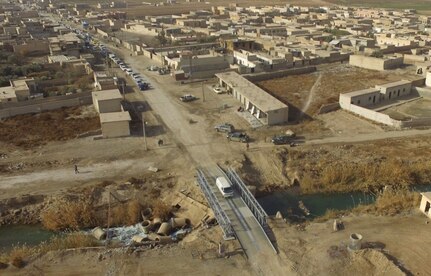War and Conflict Update: January 20, 2018
An update on conflicts and related issues around the world in January, 2018.
Turk-Syrian Kurd Conflict (2018)-In the midst of the Syrian Civil War and the related Islamic State War, Turkey launched attacks on the Syrian Kurdish forces in the area of Afrin, in northeast Syria. Turkey claims that the Kurdish group there, the Kurdish YPG (Syrian Kurdish People’s Protection Units) , are in alliance with the Kurdish People’s Party (PKK), which is a Turkish Kurd force that has been battling the Turkish government since 1978. Turkey considers the PKK and, by extension the YPG, as terrorists.
Complicating factors include the fact that the United States supports the YPG, as these Syrian Kurds have been a significant force in the war against the Islamic State (and also against the regime of Syrian President Assad). Also, Russian military forces, which are allied with Assad, are also in the general area of Afrin.

Photo By: Staff Sgt. Richard Lutz of bridge erected by U.S. troops in Raqqa, Syria, following that city’s liberation by Coalition forces.
Islamic State War-U.S. and Coalition forces continue to fight against ISIS in Syria and Iraq. In a press release, the U.S. military stated that “between Jan. 12 and Jan. 18, Coalition military forces conducted
63 strikes consisting of 102 engagements against ISIS terrorists in Syria and Iraq.”
U.S. Strategic Update –Secretary of Defense James Mattis issued the updated National Defense Strategy on January 19, with the big takeaways from this updated policy document stating that waging war on terrorism is no longer the primary defense goal of the United States. Instead, the focus returns to seeing China and Russia as the major strategic opponents of the United States. A quote from the document on this states:
China is a strategic competitor using predatory economics to intimidate its neighbors while militarizing
features in the South China Sea. Russia has violated the borders of nearby nations and pursues veto
power over the economic, diplomatic, and security decisions of its neighbors. As well, North Korea’s
outlaw actions and reckless rhetoric continue despite United Nation’s censure and sanctions. Iran
continues to sow violence and remains the most significant challenge to Middle East stability. Despite
the defeat of ISIS’s physical caliphate, threats to stability remain as terrorist groups with long reach
continue to murder the innocent and threaten peace more broadly.
Clearly, the U.S. has many opponents and potential military foes out there, with North Korea, ISIS, and other Jihadist groups out there, plus of course, Iran and the nuclear issue there. The fact that the Pentagon is seeing Russia as hostile power (again) despite the ongoing “Russia-Gate” issues embroiling President Trump politically is a welcome clear-eyed appraisal of the ongoing hostility of the Putin regime in Moscow. Also, Mattis and the Pentagon realize that China’s recent military updates and strategic expansion in the South China Sea are threats to American security and that of our allies in the region.
South China Sea Disputes – Speaking of the Chinese expansion in the South China Sea, on January 17, 2018, the U.S. Navy destroyer USS Hopper sailed within 12 nautical miles of Scarborough Shoal. China has developed a series of artificial islands in the region, and has militarized them. The U.S. and other nations in the region do not recognize China’s claims of sovereignty. Scarborough Island, which is where the American ship sailed by, is a tiny, uninhabited reef seized by China from the Philippines in 2012. The Chinese call the island Huangyan Island. China issued a complaint about the sail-by conducted by the Hopper.
India ICBM Test-On January 18, 2018, India tested a new Intercontinental Ballistic Missile (ICBM), called the Agni-V. This missile is capable of carrying a nuclear warhead to anywhere in Pakistan or most of China. Pakistan and China are India’s two most important strategic foes, and both also possess nuclear weapons. India and China are currently arguing over possession of territory in the Hoklam region near Bhutan.
India-Pakistan Conflict over Kashmir-Cross-border fighting continued between Pakistani and Indian forces in Kashmir, killing several soldiers and civilians. Border clashes are common at the frontier between Pakistani-controlled Kashmir and Indian-controlled Kashmir. The two rivals have fought several wars and the Kashmir issue is one of the world’s long-standing border conflicts and is a potential flashpoint for these two nuclear-armed nations.
Somalia Conflict-The war in Somalia continues, with the Somali government, aided by allied African nations and the United States, fighting against the al-Qaida allied al-Shabab Jihadist rebels. On January 19, the U.S. Military’s Africa Command announced that an airstrike was carried out Thursday about 31 miles northwest of the port city of Kismayo against al-Shabab. Also, American and Somali special forces raided a Shabab encampment, killing several militants and rescuing around 30 children kidnapped by the the Jihadists. American troops are increasingly working on the ground with Somali forces as American involvement in the war changes and increases.
